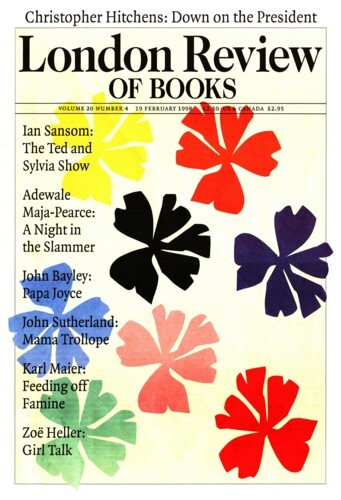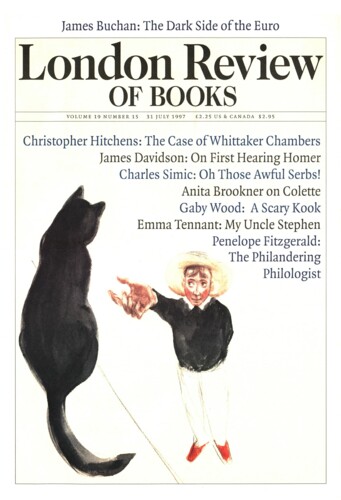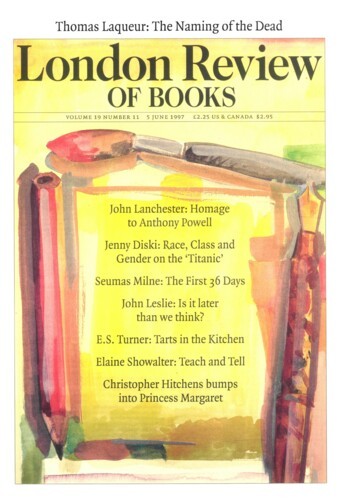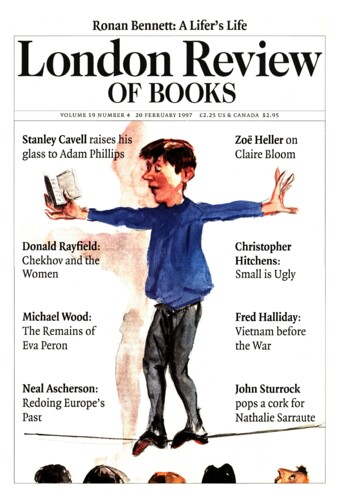Christopher Hitchens
Christopher Hitchens, who died in 2011 at the age of 62, wrote several dozen pieces for the LRB between 1983 and 2002. A Hitch in Time, a collection of some of them, is published by Atlantic.
Brief Shining Moments: Donkey Business in the White House
Christopher Hitchens, 19 February 1998
In Arthur Schlesinger’S court history, A Thousand Days: John F. Kennedy in the White House, which might without unfairness be called the founding breviary of the cult of JFK, there appears the following vignette. Schlesinger had been asked to carpenter a ‘White Paper’ justifying Washington’s destabilisation of Cuba, in which the high-flown rhetoric of the New Frontier might form a sort of scab over the fouler business of empire. This task he readily performed, scampering back to the Oval Office for a chat with the divine one:‘
A Regular Bull
Christopher Hitchens, 31 July 1997
I once had the luck to meet the great Saul Bellow, who in the course of the evening told me the following story. In 1945 he had been engaged as a book reviewer for Henry Luce’ Time magazine. Or he thought he had been so engaged. When he turned up for work, he was informed that Whittaker Chambers, chief Pooh-Bah of the ‘back of the book’, wished to see him. He entered the sanctum and found the stout, surly presence waiting behind a desk. ‘Sit down Mr Bellow. Tell me, what did you study at university?’ Bellow replied that his study had been English literature. He was asked to give his opinion of William Wordsworth as a poet. He responded that he had always thought of William Wordsworth as one of the Romantics. ‘There is no place for you,’ said Chambers on hearing this, ‘in this organisation.’ The future Nobel Laureate was fired before he had been hired. Reflecting on this in 1989, he said he still had two questions about it. The first and unanswerable one was: what if he’d kept the job? He might be a book critic for Time to this very day. The second question was: what answer could possibly have saved him? I thought then, and I think now, that the books editor wanted the junior scribe to look him in the eye and say that William Wordsworth, a one-time revolutionary poet, had seen the error of his ways and – braving the scorn and contumely of his one-time comrades – become a reconciled conservative.’
The Trouble with HRH
Christopher Hitchens, 5 June 1997
Amid all the wretched declension of the British royal family, many people seem willing to suspend their general disapproval, disappointment, boredom, nausea – you name it – in the case of Our Sovereign Lady The Queen. Unselfish, dutiful, serious, modest, faithful unto death, she rises above the showbiz values, disco ambitions and petty neuroses of her clan and brood. But does she truly deserve such a dispensation? Monarchs may be able to elude responsibility for many things, but surely the state of the monarchy is not among them. And the Queen made at least two decisions of her own which contributed to the present zoo-like condition of her relatives. The first was her choice of consort: the hawkish and chilly authoritarian who made such a hell of his offspring’s childhood. The second was her resolution, so pious and so carefully meditated, to sacrifice her only sister’s happiness for the greater cause of family values and the high duty of setting an example. This is the House of Windsor, not the House of Atreus (let’s keep our sense of proportion), but still, here if anywhere was its original sin. Does Brenda, even now, look wistfully back on a time when marriage to a divorced war hero was considered the height of scandal and required the officiousness of the aptly-named Cantuar?’
Bill and Dick’s Excellent Adventure
Christopher Hitchens, 20 February 1997
I was travelling in Illinois when I first heard some beefy local pol utter the profound Post-Modern truth that ‘Politics is showbiz for ugly people.’ Yes, you too may be a mediocre, flaky-scalped, pudgy sycophant. But, with the right ‘skills’, you also can possess a cellular phone and keep a limo on call and ‘take meetings’ and issue terse directives like ‘I want this yesterday, understand.’ Unfortunately, the women you meet in the politics biz will tend to be rather too much like yourself. But, hey, bimbos can be rented! And won’t they just be impressed to death when you pass them the bedroom telephone extension and it’s the Prez talking.
Pieces about Christopher Hitchens in the LRB
It’s Been a Lot of Fun: Hitchens’s Hitchens
David Runciman, 24 June 2010
In his book about religion, Peter Hitchens has a lot more to say about his brother Christopher than Christopher has to say about Peter in his book about himself.* ‘Some brothers get...
The Positions He Takes: Hitchens on Paine
John Barrell, 30 November 2006
‘If the rights of man are to be upheld in a dark time, we shall require an age of reason,’ wrote Christopher Hitchens last year on the dust jacket of Harvey Kaye’s recent book...
‘No Bullshit’ Bullshit: Christopher Hitchens, Englishman
Stefan Collini, 23 January 2003
Winning is very important to Christopher Hitchens. Dr Johnson was said to ‘talk for victory’, and by all accounts it seems the same might be said of Hitchens. He certainly writes for...
How would Richelieu and Mazarin have coped? Henry Kissinger
R.W. Johnson, 20 September 2001
In this short book, Christopher Hitchens sets down the main charges against Kissinger: murder, violation of human rights and complicity in mass atrocities on a scale equalled only by Eichmann,...
Mendacious Flowers: Clinton Baiting
Martin Jay, 29 July 1999
‘The crude commercialism of America, its materialising spirit, its indifference to the poetical side of things, and its lack of imagination and of high unattainable ideals are entirely due...
Why Calcutta?
Amit Chaudhuri, 4 January 1996
Among the welter of images and mythologies that constitute the middle-class Bengali’s consciousness – P3 and Ganesh underwear, the Communist hammer and sickle, Lenin’s face,...
Against it
Ross McKibbin, 24 February 1994
Christopher Hitchens may not be ‘the nearest thing to a one-man band since I.F. Stone laid down his pen’, but he comes close. For the Sake of Argument records a life of action, of...
Further Left
R.W. Johnson, 16 August 1990
Many years ago it was the habit of the PPE tutors in Magdalen College, Oxford to hold a discussion group for their undergraduates. At one such meeting we were somewhat disconcerted to find we had...
Royalties
John Sutherland, 14 June 1990
Deference to royalty in this country is enforced by a judicial and popular savagery which is always there but only occasionally glimpsed. The glimpses are instructive. In 1937 the diplomat...
Opportunities
David Gilmour, 1 June 1989
Hitchens was right to go West. He needed lusher plains of political corruption across which to spread himself. He needed a country of wide horizons and myopic international vision. And he needed...
Passionate Purposes
Keith Kyle, 6 September 1984
There used to be a type of book known as the ‘Secret History’ of some international problem. With some passion, extensive citation of material, and a somewhat self-regarding manner,...
Read anywhere with the London Review of Books app, available now from the App Store for Apple devices, Google Play for Android devices and Amazon for your Kindle Fire.
Sign up to our newsletter
For highlights from the latest issue, our archive and the blog, as well as news, events and exclusive promotions.




